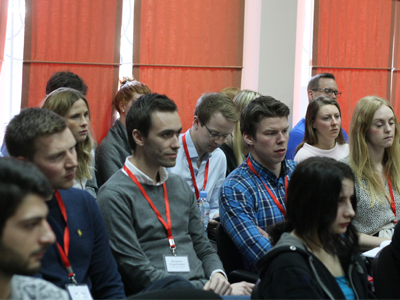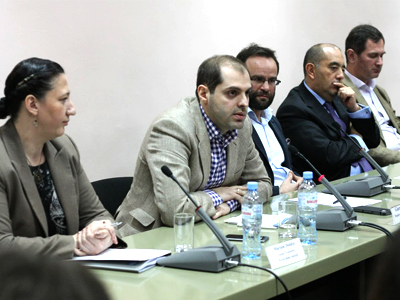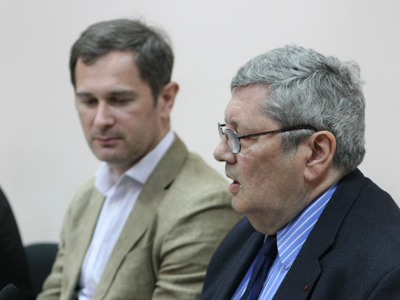Held on April 8, this discussion was a part of the four-day anti-corruption program ISET organized for a large group of students and faculty from ISET’s partner university, Norwegian School of Economics (NHH) in Bergen. The expert panel included Jacques Fleury, former CEO of Borjomi LLC and JSC Château Mukhrani; Mariam Dolidze, Senior Economist at World Bank Georgia; Archil Bakuradze, Chairman of Supervisory Board at JSC Crystal Georgia; Bruno Balvanera, Resident Representative of EBRD Georgia; Giorgi Oniani, Deputy Executive Director of Transparency International Georgia; and ISET President Eric Livny, who also moderated the discussion.
The discussion started with an overview of Georgia’s emergence from the state of civil war, lawlessness and corruption, as illustrated by Jacques Fleury’s story of rebuilding Borjomi– Georgia’s leading mineral water company – in a “legal” environment in which the courts were a private business like any other. Mariam Dolidze underscored Georgia’s post-Rose Revolution achievements in business-friendly reforms, as reflected in its progress in the World Bank’s Doing Business and other international rankings. She also listed outstanding challenges such as judicial system reforms, labor qualifications, (external) market size and infrastructure.
Archil Bakuradze focused on the shortcomings of Georgia’s justice system, such as the almost complete lack of judicial independence during the latter part of the Saakashvili regime. Why partially addressed by the current administration, this weakness translates into property rights risks and is a major concern for investors.
According to Bruno Balvanera, small country size is a poor excuse for Georgia not to address weaknesses in the judiciary and other elements of the business environment. Being a small country, Georgia is required to do better than its peers in order to attract foreign capital and become a destination of choice for regional businesses.
A very interesting discussion centered on the question of whether or not Georgia should continue with zero-tolerance policies which have been very important in the early reform period.
According to Eric Livny, the young generation of Georgians does not know how to give or take bribes. Yet, the current tax administration and public procurement rules, to take two obvious examples, are designed to battle crime and corruption rather than deliver a business friendly environment and efficiency.
Livny argued that time may have come to introduce greater discretion in public administration. For example, revenue service personnel should not be punished for erring on the low side when penalizing businesses; likewise, procurement decisions should be based not only on price but also quality.
Giorgi Oniani, representing TI-Georgia, disagreed with Livny’s proposition. According to him, Georgia’s achievements in anti-corruption policies would be put at risk in case zero-tolerance policies are softened. Oniani also argued for strengthening Georgia’s system of democratic checks and balances (independent courts and a stronger parliament), which is key to preventing corruption and favoritism at the highest level of the executive branch of government.













